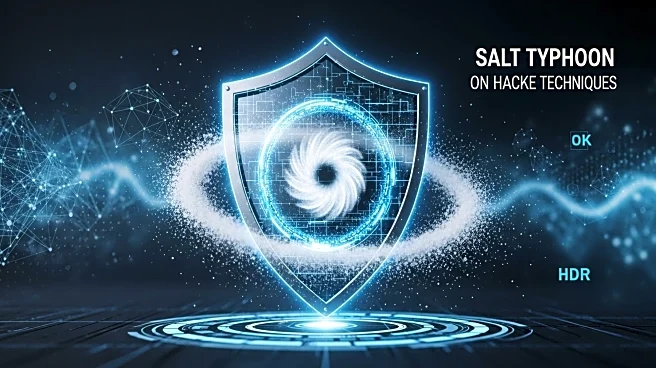What's Happening?
Hackers are increasingly adopting techniques used by the Chinese group Salt Typhoon, which infiltrated major telecommunications providers last year. Rich Baich, Chief Information Security Officer at AT&T, discussed this trend at the Google Cloud Cyber Defense Summit. Salt Typhoon's approach involved targeting unconventional weak spots, such as platforms without endpoint detection and response (EDR) capabilities. They also utilized 'living off the land' attacks, using legitimate tools within a victim's network. Baich emphasized the need for network defenders to adapt by securing administrative tools and understanding how technology can be exploited.
Why It's Important?
The shift in hacker strategies poses significant challenges for cybersecurity professionals. As attackers bypass traditional security measures, companies must innovate to protect their networks. This evolution in cyber threats could lead to increased vulnerabilities in sectors reliant on digital infrastructure, such as telecommunications and finance. Organizations may need to invest in advanced security technologies and training to counter these sophisticated methods. The broader impact includes potential disruptions in service and increased costs for cybersecurity measures, affecting both businesses and consumers.
What's Next?
Cybersecurity experts and companies are likely to focus on enhancing their detection and response capabilities across all platforms. This may involve developing new security protocols and investing in technologies that can identify and mitigate unconventional attack vectors. Collaboration between industry leaders and government agencies could be crucial in addressing these evolving threats. Additionally, there may be increased emphasis on cybersecurity education and awareness to prepare professionals for these new challenges.
Beyond the Headlines
The rise of unconventional hacking techniques raises ethical and legal questions about cybersecurity practices. Companies must balance the need for robust security with privacy concerns, as increased monitoring could infringe on user rights. Furthermore, the global nature of cyber threats necessitates international cooperation, which can be complicated by geopolitical tensions. Long-term, this trend may drive innovation in cybersecurity, leading to new technologies and strategies that redefine industry standards.










